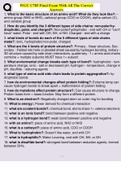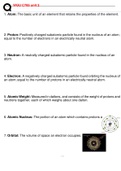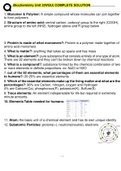Nelson00
On this page, you find all documents, package deals, and flashcards offered by seller Nelson00.
- 556
- 0
- 40
Community
- Followers
- Following
16 Reviews received
602 items

WGU c785 COMPLETE SOLUTION
WGU c785 COMPLETE SOLUTION 1. polymerase chain reaction (PCR): process to copy DNA 2. What is needed to complete PCR: Template DNA, Nucleotides (dNTPS), DNA Polymerase, and DNA 3. Steps of PCR: denaturation, annealing, elongation 4. denaturation: loss of normal shape of a protein due to heat or other factor 5. Annealing: cooled to 50c primers stick and want to copy and add DNA poly- merase 6. Elongation: reaction heated to 70C and DNA polymerase add nucleotides building a new DNA stran...
- Package deal
- Exam (elaborations)
- • 8 pages •
WGU c785 COMPLETE SOLUTION 1. polymerase chain reaction (PCR): process to copy DNA 2. What is needed to complete PCR: Template DNA, Nucleotides (dNTPS), DNA Polymerase, and DNA 3. Steps of PCR: denaturation, annealing, elongation 4. denaturation: loss of normal shape of a protein due to heat or other factor 5. Annealing: cooled to 50c primers stick and want to copy and add DNA poly- merase 6. Elongation: reaction heated to 70C and DNA polymerase add nucleotides building a new DNA stran...

WGU C785 Final Exam With All The Correct Answers
WGU C785 Final Exam With All The Correct Answers 1. What is the basic structure of an amino acid? What do they look like?: - amino group (NH2 or NH3), carboxyl group (COO or COOH), alpha carbon (C), and variable group 2. How do you identify the 3 different types of side chains: non-polar/hy- drophobic, polar, and charged?: Non-polar/hydrophobic - end with CH or "can't have" water. Polar - end with OH, SH, or NH. Charged - end with a charge 3. what kinds of bonds do each of the 3 differen...
- Package deal
- Exam (elaborations)
- • 16 pages •
WGU C785 Final Exam With All The Correct Answers 1. What is the basic structure of an amino acid? What do they look like?: - amino group (NH2 or NH3), carboxyl group (COO or COOH), alpha carbon (C), and variable group 2. How do you identify the 3 different types of side chains: non-polar/hy- drophobic, polar, and charged?: Non-polar/hydrophobic - end with CH or "can't have" water. Polar - end with OH, SH, or NH. Charged - end with a charge 3. what kinds of bonds do each of the 3 differen...

WGU 785 Final Exam Latest 2021 With Complete Solution
WGU 785 Final Exam Latest 2021 With Complete Solution 1. Hemophilia Pedigree - Father has hemophilia, mother does not. What is the outcome for their kids?: His daughters would be carriers. This is x-link recessive. 2. Autosomal: Dominant:: Autosomal: males and females equally affected. Dominant: non-carrier parents 3. polymerase chain reaction (PCR): The process of copying DNA in the lab. Uses Template DNA, Nucleotides (dNTPS), DNA Polymerase, and DNA primers. 4. 3 Steps of PCR: 1. Dena...
- Package deal
- Exam (elaborations)
- • 13 pages •
WGU 785 Final Exam Latest 2021 With Complete Solution 1. Hemophilia Pedigree - Father has hemophilia, mother does not. What is the outcome for their kids?: His daughters would be carriers. This is x-link recessive. 2. Autosomal: Dominant:: Autosomal: males and females equally affected. Dominant: non-carrier parents 3. polymerase chain reaction (PCR): The process of copying DNA in the lab. Uses Template DNA, Nucleotides (dNTPS), DNA Polymerase, and DNA primers. 4. 3 Steps of PCR: 1. Dena...

Parts of the eye
Parts of the eye 1. cornea transparent front surface of the eye 2. optic nerve the nerve that carries neural impulses from the eye to the brain 3. retina The light-sensitive inner surface of the eye, containing the receptor rods and cones plus layers of neurons that begin the processing of visual information. 4. vitreous humor soft, jelly-like material behind the lens in the vitreous chamber; helps maintain the shape of the...
- Exam (elaborations)
- • 3 pages •
Parts of the eye 1. cornea transparent front surface of the eye 2. optic nerve the nerve that carries neural impulses from the eye to the brain 3. retina The light-sensitive inner surface of the eye, containing the receptor rods and cones plus layers of neurons that begin the processing of visual information. 4. vitreous humor soft, jelly-like material behind the lens in the vitreous chamber; helps maintain the shape of the...

biochemistry WGU unit 4: DNA and RNA
biochemistry WGU unit 4: DNA and RNA 1. Which nucleotides base-pair together form DNA?: Adenine to thyamine 2. gene expression: process by which a gene produces its product and the product carries out its function 3. DNA: deoxyribonucleic acid Stored in the nucleus DNA does not leave nucleus It must be copied into a new molecule. This molecule is called mRNA or messanger RNA The process of making it is called transcription mRNA gets picked up by ribosomes (machines used to make pro...
- Package deal
- Exam (elaborations)
- • 8 pages •
biochemistry WGU unit 4: DNA and RNA 1. Which nucleotides base-pair together form DNA?: Adenine to thyamine 2. gene expression: process by which a gene produces its product and the product carries out its function 3. DNA: deoxyribonucleic acid Stored in the nucleus DNA does not leave nucleus It must be copied into a new molecule. This molecule is called mRNA or messanger RNA The process of making it is called transcription mRNA gets picked up by ribosomes (machines used to make pro...

Biochemistry C785 COMPLETE SOLUTION
Biochemistry C785 COMPLETE SOLUTION 1. electron: A subatomic particle with a single negative electrical charge and a mass about 1/2,000 that of a neutron or proton. One or more electrons move around the nucleus of an atom. 2. energy: The capacity to cause change, especially to do work (to move matter against an opposing force). 3. covalent bond (kM-v 2-:leAntty)pe of strong chemical bond in which two atoms share one or more pairs of valence electrons. 4. ionic bond (+-on2-i:kA) opposit...
- Package deal
- Exam (elaborations)
- • 3 pages •
Biochemistry C785 COMPLETE SOLUTION 1. electron: A subatomic particle with a single negative electrical charge and a mass about 1/2,000 that of a neutron or proton. One or more electrons move around the nucleus of an atom. 2. energy: The capacity to cause change, especially to do work (to move matter against an opposing force). 3. covalent bond (kM-v 2-:leAntty)pe of strong chemical bond in which two atoms share one or more pairs of valence electrons. 4. ionic bond (+-on2-i:kA) opposit...

WGU C785 unit 2
WGU C785 unit 2 1. Atom: The basic unit of an element that retains the properties of the element. 2. Proton: Positively charged subatomic particle found in the nucleus of an atom; equal to the number of electrons in an electrically neutral atom. 3. Neutron: A neutrally charged subatomic particle found in the nucleus of an atom. 4. Electron: A negatively charged subatomic particle found orbiting the nucleus of an atom; equal to the number of protons in an electrically ne...
- Package deal
- Exam (elaborations)
- • 5 pages •
WGU C785 unit 2 1. Atom: The basic unit of an element that retains the properties of the element. 2. Proton: Positively charged subatomic particle found in the nucleus of an atom; equal to the number of electrons in an electrically neutral atom. 3. Neutron: A neutrally charged subatomic particle found in the nucleus of an atom. 4. Electron: A negatively charged subatomic particle found orbiting the nucleus of an atom; equal to the number of protons in an electrically ne...

WGU C785 unit 2 COMPLETE SOLUTION
WGU C785 unit 2 COMPLETE SOLUTION 1. Hydrogen bond: Weak bond interaction Between two molecules 2. amino group: Consists of hydorgen and nitrogen atoms (-NH3+) 3. macromolecules: A giant molecule in a living organism formed by the joining of smaller molecules: a protein, carbohydrate, or nucleic acid. 4. polymer: a long molecule consisting of many similar or identical building blocks linked by covalent bonds 5. Amino acid: Amino group + Carboxylic acid + R group = Amino acid ...
- Package deal
- Exam (elaborations)
- • 10 pages •
WGU C785 unit 2 COMPLETE SOLUTION 1. Hydrogen bond: Weak bond interaction Between two molecules 2. amino group: Consists of hydorgen and nitrogen atoms (-NH3+) 3. macromolecules: A giant molecule in a living organism formed by the joining of smaller molecules: a protein, carbohydrate, or nucleic acid. 4. polymer: a long molecule consisting of many similar or identical building blocks linked by covalent bonds 5. Amino acid: Amino group + Carboxylic acid + R group = Amino acid ...

WGU C785 COMPLETE EXAM QUESTIONS AND ANSWERS GRADED A
WGU C785 COMPLETE EXAM QUESTIONS AND ANSWERS GRADED A 1. What is the basic structure of an amino acid? What do they look like?: - amino group (NH2 or NH3), carboxyl group (COO or COOH), alpha carbon (C), and variable group 2. How do you identify the 3 different types of side chains: non-polar/hy- drophobic, polar, and charged?: Non-polar/hydrophobic - end with CH or "can't have" water. Polar - end with OH, SH, or NH. Charged - end with a charge 3. what kinds of bonds do each of the 3 ...
- Package deal
- Exam (elaborations)
- • 16 pages •
WGU C785 COMPLETE EXAM QUESTIONS AND ANSWERS GRADED A 1. What is the basic structure of an amino acid? What do they look like?: - amino group (NH2 or NH3), carboxyl group (COO or COOH), alpha carbon (C), and variable group 2. How do you identify the 3 different types of side chains: non-polar/hy- drophobic, polar, and charged?: Non-polar/hydrophobic - end with CH or "can't have" water. Polar - end with OH, SH, or NH. Charged - end with a charge 3. what kinds of bonds do each of the 3 ...

Biochemistry Unit 2(WGU) COMPLETE SOLUTION
Biochemistry Unit 2(WGU) COMPLETE SOLUTION 1. Monomer & Polymer: A simple compound whose molecules can join together to form polymers 2. Structure of amino acid: central carbon, carboxyl group to the right (COOH), amine group to the left (NH2), hydrogen above and R group below 3. Protein is made of what monomers?: Protein is a polymer made together of amino acid monomers 4. What is matter?: anything that takes up space and has mass 5. What is an element?: pure substance that consi...
- Package deal
- Exam (elaborations)
- • 35 pages •
Biochemistry Unit 2(WGU) COMPLETE SOLUTION 1. Monomer & Polymer: A simple compound whose molecules can join together to form polymers 2. Structure of amino acid: central carbon, carboxyl group to the right (COOH), amine group to the left (NH2), hydrogen above and R group below 3. Protein is made of what monomers?: Protein is a polymer made together of amino acid monomers 4. What is matter?: anything that takes up space and has mass 5. What is an element?: pure substance that consi...

ESSENCE OF ANTHROPOLOGY 4TH EDITION By HAVILAND -Test Bank
HESI EXIT RN EXAM (2020/2021) V1-V7 110 OUT OF THE 160 TOTAL QUESTIONS FOR EACH VERSION AUTHENTIC HESI Review over 700 QUESTIONS to the 2019 and 2020 EXIT EXAM HESI EXIT EXAM Review Questions COVERING (V1-V6) NURSING MISC HESI Exit Exam RN 2019/2020 (Upd
ATI RN LEADERSHIP PROCTORED EXAM 2019 VERSION 1 2 3{LATEST 2023 }
ATI RN LEADERSHIP PROCTORED EXAM 2019 VERSION 1 2 3{LATEST 2023 }
Evidence Based Practice For Nurses 4th Edition By Schmidt Brown – Test Bank